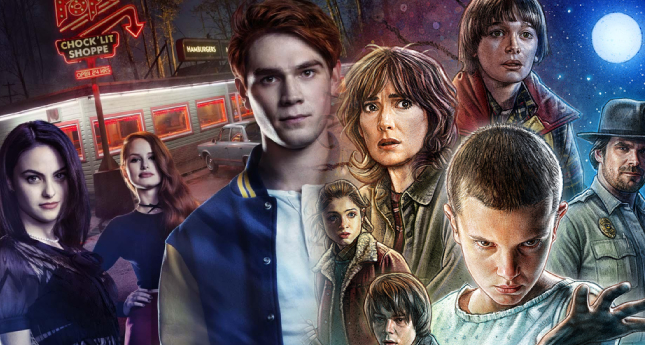Even if the TV world is codified in several specific genres, hybridised television series that intertwine those different types of storylines are arising.
Turning on the TV used to mean always seeing the same things. A crime TV series, then a romance, and between those two a cooking show to know who will bake the best cupcake. TV shows are patterned with very specific genres, viewers know what to expect and will look for the shows they know they will like. Since making a TV show is an expensive investment, the TV industry often looks for “safe bets” and “what already works”. That kind of mind-set often leads to remakes and repeats.
But in the last decade, the number of TV shows has exploded, and the content cannot always stay the same. Storytelling is as broad as the human experience. And while the human experience is vast, it is not infinite. From Shakespeare to Tarantino, the same themes remain; people speak of love, war and heartbreak. Very few storylines are really ever new, we are only framing stories in different ways. Therefore, the new trend is to hybridise TV shows, to create original content by combining already existing genres. For example, Downtown Abbey skilfully combines drama with the period genre. Similarly, The Vampire Diaries mixes the Dark Fantasy genre with the typical high school TV show.
Now, the question is: are those hybrid shows original series, or are they only the boring fusion of shows that have already been visited and revisited? The answer is, it depends. It depends on whether the hybridisation is only the product of a lack of originality, like on most police shows where an unconvincing love story is added to the plot, or if it illustrates a true will of challenging and surprising the audience by breaking the rules. Every movie and TV genre has its own set of rules: A romantic comedy should be light and upbeat while a horror piece calls for darkness and suspense. We can easily argue that the very act of hybridisation breaks those rules and is, therefore, new and unique.
This intent of the producers is often transparent. Stranger Things cleverly combines an atmosphere of anxiety with the ordinary life and concerns of teenagers, to a point where the line between the genres cannot be drawn. On the other hand, other shows like Riverdale contain pretty much the same genres, but they are just juxtaposed, they never blend into each other. The effect is that the audience is not taken aback by the newness of the concept, but simply comforted in the same genres they know.
In conclusion, saying that hybridised TV shows are just a remake is a bit easy. There are too many televisions series, for too few available plots and genres to create something entirely different. Even TV shows that have are publicly acclaimed as innovative are just a big mix of existing series. For example, Games of Thrones regroups the Drama, Adventure, Family, Fantasy, and Adult genres. It is nothing new, but nothing like this had ever been done before.
Zoé Renaudin
Image: Comic Book

